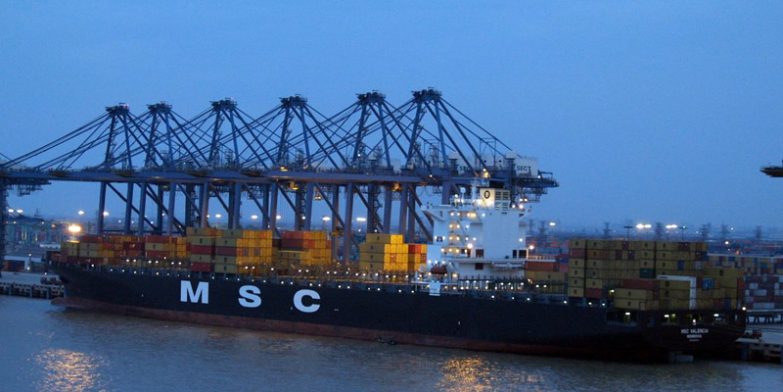
With cargo volumes in a downward cycle, air and sea freight rates have weakened on major trade-lanes and routes and further pressure will build as new airline belly-hold capacity is added and container shipping lines receive new-build vessels.
Even with the added pressure, many are hopeful that rate erosion is easing, because rock-bottom prices are not good for shippers. If carriers decide that revenue levels are not sustainable they will simply stop serving the market and that’s to no one’s benefit.
We are already seeing air cargo carriers exiting some routes and the container shipping lines are restructuring their networks to meet the reduced demand, with 2M withdrawing one of their primary Asia-North Europe services, after blanking the service for consecutive weeks.
OCEAN
Many of the container shipping lines had been focused on gaining volume and capturing market share, however that appears to have changed, with carriers now looking to manage capacity, to try and reverse the rate decline, with the blank sailing program continuing long after the CNY break.
The global container shipping fleet is expected to grow by 6.3% and 8.1% in 2023 and 2024 respectively, with the top-11 container shipping lines scheduled to receive 89 large container vessels in the rest of 2023.
The decision to axe one of 2M’s premium services comes as MSC is taking delivery of five new ‘megamax’ (>24K TEU) container ships, in March and April.
Chinese finished vehicle exports topped 3m units in 2022 and demand for China-made EVs remains strong, with Tesla increasing deliveries from its gigafactory in Shanghai.
The China market is planning to export 2.3m units to Europe this year, but even if all the new RoRo vessels due for completion in 2023 are delivered, it will only serve half of that number, which has led carmakers to book containerised vehicle shipments, which are far cheaper than RoRo alternatives.
Vehicle exporters are loading hundreds of containers a day and if numbers continue to increase, it may start to impact available space in April, though there are concerns regarding the potential hazard posed by EVs.
Vessel schedule reliability hit 52.6% in January, representing an improvement of 22% on a year earlier, while the average vessel arrival delay is 5.26 days, which is a decrease of -2.68 days on 2022. Maersk was the most reliable leading carrier with 58.3%, followed by MSC with 57.7%.
Headhaul rates from Asia to Europe softened again, with the second half of March expected to see further drops and carriers now actively looking to secure long-term business with fixed rates.
Backhaul rates are still decreasing slightly and remain on a very low level. The space situation is relaxed and there are no issues with capacity, only vessel delays, even though a high number of blank sailings in March are expected.
Transatlantic FAK rates from the US are now stable, after some softening in the first two months of the quarter. There is no change in capacity and schedules and services are returning to some normalcy.
Transpacific rates are stable in both directions, with a headhaul capacity increase, as imports from Asia plunged 31% YoY in February – the 6th month of YoY declines.
On the transatlantic headhaul, schedule integrity improved and vessel space is generally available on short notice, but can be tight on certain services, so well worth checking with us asap.
Inland transport operations in Europe are generally efficient, but the threat of disruption due to strikes continue in some regions. In the US the overall inland situation has improved significantly, but some capacity constraints within rail yards remain and chassis shortages still occur.
AIR
Volumes to the US and Northern Europe increased very slightly post the Lunar New Year slowdown, but nowhere near the volumes of 2022, though the comparison is not precise, as the Lunar Year fell on different dates.
eCommerce movements remain buoyant, but not to the extent anticipated, amidst high inflation.
The earthquake in Turkey and Syria dealt a huge blow to the operation of certain trade-lanes and availability of some commodities, while overall supply chain disruptions have been limited. Considerable humanitarian aid volumes into Turkey/Syria continue.
Overall demand was down -20% in February, compared to the same period in 2022, while capacity growth is up +18%, with month on month increases, as belly capacity continues to grow with more passenger frequency. Global scheduled capacity is more than sufficient to support the current volumes, which are likely to remain flat, as they were in the second half of 2022.
Spot rates on the primary ex Asia routes are down around – 20% in YoY comparisons and the market remains ultra competitive, with little value in setting monthly rates.
Global oil inventories have started to build slowly, which should prompt a gradual decline in average prices, though the earthquake in Turkey prompted oil terminal closures and spiked prices for a short while. Further impacts cannot be estimated at this point.
Analysts suggest that long term rates are likely to stabilise towards mid of Q2 2023.
Whatever challenges your supply chain may face, the price and capacity agreements we have in place with our long-term partner air and ocean carriers mean that we continue to deliver resilient and reliable supply chain solutions.
Our purchase order management and supply chain tracking technology support the most demanding global trading regimes, providing transparency and control. EMAIL Andy Costara to learn more and see how our technology can support your supply chain.





